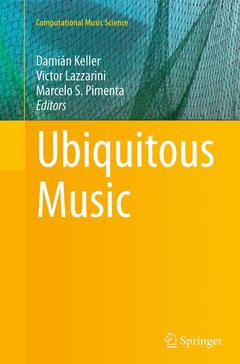Description
Ubiquitous Music, Softcover reprint of the original 1st ed. 2014
Computational Music Science Series
Language: EnglishPublication date: 08-2016
Support: Print on demand
Publication date: 12-2014
153 p. · 15.5x23.5 cm · Hardback
Description
/li>Contents
/li>Biography
/li>Comment
/li>
This is the first monograph dedicated to this interdisciplinary research area, combining the views of music, computer science, education, creativity studies, psychology, and engineering. The contributions include introductions to ubiquitous music research, featuring theory, applications, and technological development, and descriptions of permanent community initiatives such as virtual forums, multi-institutional research projects, and collaborative publications.
The book will be of value to researchers and educators in all domains engaged with creativity, computing, music, and digital arts.
Dr. Damián Keller received his DMA from Stanford University in 2004. He teaches music and computing at the Federal University of Acre (UFAC) in Brazil. He is a member and cofounder of the Ubiquitous Music Group (g-ubimus) and his research focuses on everyday creativity, software design and ecocomposition within the context of ubiquitous music making.
Dr. Victor Lazzarini received his Ph.D. from the University of Nottingham, where he was received the Heyman scholarship for research progress and the Hallward composition prize. He leads the Sound and Digital Music Research Group in the School of Music at NUI Maynooth (Ireland). His interests include musical signal processing and sound synthesis, computer music languages, and electroacoustic and instrumental composition.
Dr. Marcelo S. Pimenta received his Ph.D. in Computer Science from Université Toulouse 1 in 1997. He is an associate professor in the Institute of Informatics (INF) at the Federal University of Rio Grande do Sul (UFRGS), Porto Alegre. His research interests include adaptive interfaces, networked music, ubiquitous music, synergistic modeling, human aspects of software development, user-centered software engineering, and new forms of governance and the delivery of public services with the support of information technologies.





